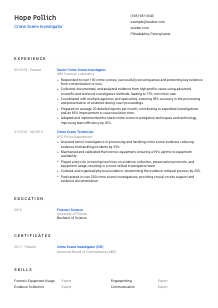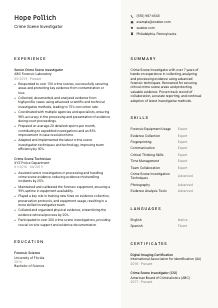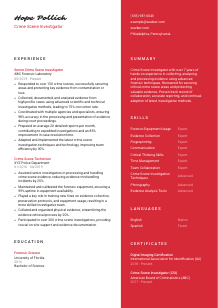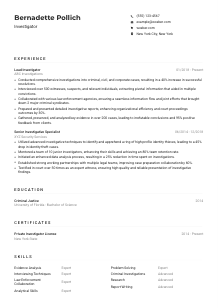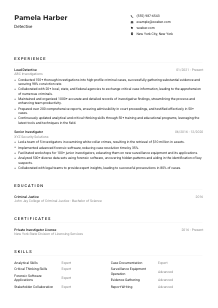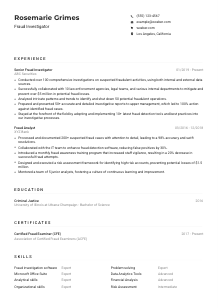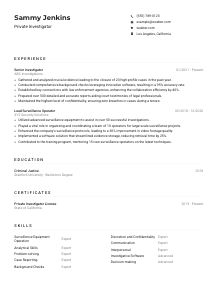Crime Scene Investigator Resume Example
Unraveling mysteries, but your resume seems encrypted? Dive into this Crime Scene Investigator resume example, decrypted with Wozber free resume builder. See how you can infuse your forensic flair with job specifics, painting a career picture that's just as detailed as the cases you crack!
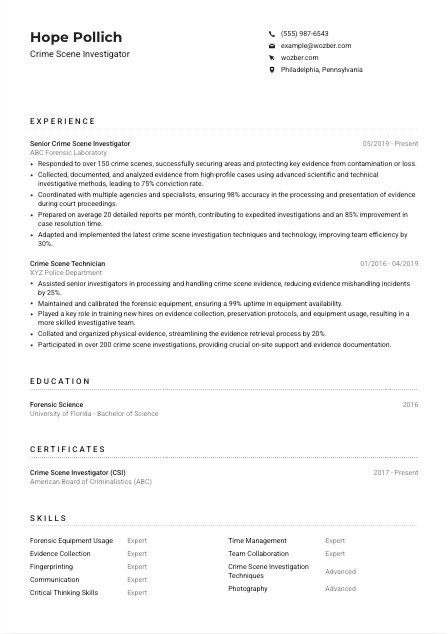
How to write a Crime Scene Investigator Resume?
Embarking on the journey to secure a Crime Scene Investigator position? Your resume is the key evidence in proving you're the right fit for the role. Crafting a resume using the best practices, including ATS optimization, may seem daunting. Yet, with Wozber, a free resume builder at your disposal, creating an ATS-compliant resume tailored precisely to your dream job is not only possible but straightforward.
Let's guide you through the creative process, underpinning your resume with the forensic precision your profession demands. Ready to unfold the mystery of drafting a compelling Crime Scene Investigator resume? Dive in!
Personal Details
The Personal Details section is your resume's fingerprint – unique and identifying. Let's dissect how to leave a forensic mark that aligns precisely with the expectations for a Crime Scene Investigator.
1. Highlight Your Name
Consider your name the bold headline of your story. Use a clean, ATS-friendly font, positioning it prominently on your resume. This ensures you grasp attention right from the start.
2. Tailor with the Desired Job Title
Directly beneath your name, feature the position you're aiming for: "Crime Scene Investigator". This strategical move aligns your aspirations with the job opening, acting like a magnet for recruiters scanning for role-specific resumes.
3. Essential Contact Info
Ensure your contact information is crisp, complete, and reliable. Meticulously check your phone number and opt for a professional email format. A minor error here could disrupt a potential connection.
4. Location Match
Living in Philadelphia, Pennsylvania, as required? Make sure to clarify your location upfront to align with the employer's logistical preferences. This subtlety underscores your fit for the role, free of relocation delays.
5. Online Persona
Add a professional website or LinkedIn profile, if available. This not only showcases a well-rounded professional presence but also gives potential employers a deeper insight into your career journey.
Takeaway
Bear in mind, your Personal Details section is like establishing the crime scene perimeter – essential and foundational. Paying attention to these details establishes the initial connection, paving the way for the narrative of your professional journey.





Experience
The Experience section is where you shine a light on your investigative career milestones. Let's examine how to craft a narrative that testifies to your suitability for the Crime Scene Investigator role, with each accomplishment a crucial piece of evidence.
- Responded to over 150 crime scenes, successfully securing areas and protecting key evidence from contamination or loss.
- Collected, documented, and analyzed evidence from high‑profile cases using advanced scientific and technical investigative methods, leading to 75% conviction rate.
- Coordinated with multiple agencies and specialists, ensuring 98% accuracy in the processing and presentation of evidence during court proceedings.
- Prepared on average 20 detailed reports per month, contributing to expedited investigations and an 85% improvement in case resolution time.
- Adapted and implemented the latest crime scene investigation techniques and technology, improving team efficiency by 30%.
- Assisted senior investigators in processing and handling crime scene evidence, reducing evidence mishandling incidents by 25%.
- Maintained and calibrated the forensic equipment, ensuring a 99% uptime in equipment availability.
- Played a key role in training new hires on evidence collection, preservation protocols, and equipment usage, resulting in a more skilled investigative team.
- Collated and organized physical evidence, streamlining the evidence retrieval process by 20%.
- Participated in over 200 crime scene investigations, providing crucial on‑site support and evidence documentation.
1. Decipher the Role
Break down the job description, noting keywords and phrases such as "respond to crime scenes", "collect and analyze physical evidence", and "prepare detailed reports". These are your clues for tailoring your resume.
2. Structure with Evidence
List your experiences starting with the most recent. Use clear headings for job titles and company names, and precise dates to chronicle your career path, leading the hiring manager through your professional investigation.
3. Compelling Case Files
Craft bullet points that not only describe your roles but showcase achievements aligned with the job's needs. For example, "Responded to over 150 crime scenes, effectively securing areas to protect evidence from contamination or loss." This quantifies your experience while directly reflecting a job requirement.
4. Evidence Quantification
Whenever possible, embed metrics into your achievements. Detailing that you've "led to a 75% conviction rate through evidence analyzed using scientific methods" offers tangible proof of your impact.
5. Relevance is Key
Stick to what's relevant for a Crime Scene Investigator. This is not the place to marvel over unrelated skills or accomplishments, no matter how impressive. Keep the focus on forensic science and investigative prowess.
Takeaway
View your experience through the lens of the hiring manager: evidence of your capability and fit for the role should stand out. Tailor each point to reflect the job description, with quantifiable achievements that underscore your expertise. Remember, you're compiling a case file that highlights your investigative successes.
Education
In the realm of forensic science, your educational background is not just a formality; it's the bedrock of your expertise. Here's how to ensure your Education section underlines your qualifications for a Crime Scene Investigator with academic precision.
1. Key Requirement Focus
The job calls for a "Bachelor's degree in Forensic Science, Criminalistics, or a related field." Make sure your degree matches or is closely related to these specifications. Accuracy begins with presenting the right educational credentials.
2. Clear Structure
Organize your education details methodically: Degree type, field of study, institution, and graduation year. This will be your formula for presenting your academic qualifications in a clear, ATS-friendly manner.
3. Degree Detailing
For our aspiring Crime Scene Investigator, showcasing a "Bachelor of Science in Forensic Science" precisely meets the job's educational criteria. This specificity instantly boosts your resume's relevance.
4. Coursework and Honors
Relevant coursework, projects, or honors can further attest to your qualifications. Highlight any forensic science-specific accolades or activities that underscore your commitment and proficiency.
5. Continuous Learning
If your journey includes ongoing forensic education or workshops, these warrant mention. They portray you as a professional dedicated to staying at the forefront of criminological and forensic methodologies.
Takeaway
Your education section is a testament to the foundational knowledge and skills you bring to the crime scene table. Highlight it with the precision of a forensic expert, ensuring it aligns perfectly with the job's specific educational requirements. It frames the academic underpinnings of your professional narrative.
Certificates
Certifications can be the distinguishable DNA in your resume, uniquely qualifying you for the Crime Scene Investigator role. Let's delve into how to amplify this section with certifications that validate your specialized skills.
1. Vital Certifications Identified
First, pinpoint the certifications explicitly required or preferred in the job description. Possession of a "Valid Crime Scene Investigator certification" directly aligns with one of the prerequisites, offering immediate validation of your proficiency.
2. Selective Highlighting
Determine which of your certifications most closely match the job needs. Including a "Digital Imaging Certification" could distinguish your application, showcasing a proficiency in a critical forensic skill.
3. Date Accuracy
Mention the acquisition or expiration dates of certifications where relevant. Validity periods illustrate your commitment to maintaining your credentials up-to-date, a mark of professionalism.
4. Stay Current
The forensic field evolves continually, urging professionals to keep their knowledge fresh. Highlight your dedication to ongoing learning through recent or renewed certifications relevant to crime scene investigation.
Takeaway
Your certifications are not merely accolades; they are evidence of your qualifications, dedication, and commitment to excellence in forensic science. Select and present them thoughtfully, ensuring they serve to reinforce your suitability for the Crime Scene Investigator role.
Skills
In your skills section, illustrate the technical and soft skills toolbox that equips you for the demanding role of a Crime Scene Investigator. Let's match your skills precisely to the job's requirements, making each one count.
1. Dissecting the Job Description
Gather the critical skills directly from the job description, such as "strong knowledge of crime scene investigation techniques" and "proficiency in using forensic equipment." These will become the backbone of your skills section.
2. Precision in Skills Listing
Select the skills where your expertise aligns with the job's requirements. Skills like "Forensic Equipment Usage" and "Evidence Collection" directly reflect the role's demands, solidifying your candidacy.
3. Clarity and Organization
Present your skills in a clean, easy-to-read format. Keep it concise, focusing solely on the skills that highlight your qualifications for the Crime Scene Investigator position and enhance your profile.
Takeaway
Think of your skills section as an evidence vault, each skill a crucial piece of proof of your aptitude. A well-curated list not only aligns with the job description but also positions you as the prime candidate for the role. Display your skills with the confidence of an expert ready to solve any mystery.
Languages
While the core of a Crime Scene Investigator's role might not always hinge on multilingual abilities, the capacity to communicate across languages can be a unique advantage. Let's formulate how to present your linguistic strengths effectively.
1. Essential Languages Identified
Start by highlighting the key language requirement for the role. For instance, proficient English speaking skills are a must. Ensuring your resume explicitly mentions your proficiency in English is fundamental.
2. Additional Language Assets
Beyond the basic requirements, mention any additional languages you're fluent in. For example, being fluent in Spanish, as noted in our resume example, showcases an ability to communicate with a broader demographic, potentially valuable in diverse communities.
3. Honesty in Proficiency
Clearly define your level of proficiency for each language listed. This transparency ensures realistic expectations and demonstrates integrity in your presentation.
4. Tailoring to the Role
Evaluate the role's scope to determine if additional languages could offer unique advantages. While not explicitly required, they may underscore your capacity for roles involving diverse populations or international scope.
5. Global Perspective
View your multilingual abilities as a reflection of your adaptability and global perspective – traits that are valuable in any profession, adding a layer of cultural competence to your resume.
Takeaway
Your ability to speak multiple languages symbolizes more than mere communication; it reflects a readiness to engage with the world in its diversity. While not a primary requirement for a Crime Scene Investigator, your linguistic skills can nonetheless add a distinctive edge to your resume.
Summary
The Summary section is your chance to convey the compelling narrative of your career at a glance. Crafting a summary that captures your essence as a Crime Scene Investigator involves focusing on the impact you've made in your field.
1. Case Overview
Start by absorbing the essence of your professional journey and the job at hand. Recognize the pivotal moments and skills that have defined your role as a Crime Scene Investigator.
2. The Initial Pitch
Introduce yourself with a statement that encapsulates your professional identity. An engaging introduction such as, "Crime Scene Investigator with over 7 years of hands-on experience," instantly captures attention.
3. Addressing the Investigation Needs
Pinpoint key skills and achievements that resonate with the job's specifics. Mentioning your adeptness in "securing critical crime scene areas and protecting valuable evidence" highlights your direct relevance to the role.
4. Concise Deliverance
Your summary should be brief yet impactful. Communicate your qualifications, experience, and career highlights in a manner that's easy for hiring managers to scan and comprehend, compelling them to dive deeper into your resume.
Takeaway
Your resume's summary is akin to the opening statement in a court case; it sets the tone for everything that follows. Craft it with care, ensuring it succinctly captures your expertise and piques the interest of hiring managers. Let it stand as a testament to your qualifications, guiding your way to the job you're pursuing.
Solving the Career Puzzle – Your Next Steps
Congratulations, you've meticulously assembled the pieces of your Crime Scene Investigator resume, aligning each section with the precision of a forensic expert. Your tailored resume, crafted using Wozber, is your investigative report ready to be presented, demonstrating your unmatched fit for your target role. With your ATS-compliant resume in hand, embark on your job search with confidence. The world needs your expertise to unravel mysteries.
Let your resume be the key that unlocks your next career opportunity. Your journey begins now – make your mark!

- Bachelor's degree in Forensic Science, Criminalistics, or a related field.
- Minimum of 3 years of experience in crime scene investigation or in a directly related field.
- Strong knowledge of crime scene investigation techniques, evidence collection, and preservation protocols.
- Proficiency in using forensic equipment and software, including photography, fingerprinting, and evidence analysis tools.
- Excellent communication, organization, and critical thinking skills.
- Valid Crime Scene Investigator certification or equivalent, if required by the state or hiring agency.
- The role requires proficient English speaking skills.
- Must be located in Philadelphia, Pennsylvania.
- Respond to crime scenes and secure the area to protect evidence from contamination or loss.
- Collect, document, and analyze physical evidence using scientific and technical investigative methods.
- Coordinate with law enforcement, forensic specialists, and legal professionals to ensure accurate and timely processing of evidence.
- Prepare detailed reports, sketches, and diagrams related to the investigation.
- Stay updated on the latest techniques, technology, and legal requirements in the field of crime scene investigation.





